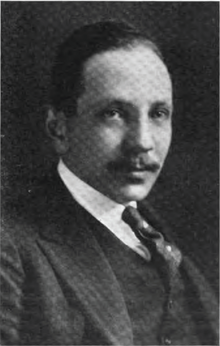- Maurice Wertheim
-
Maurice Wertheim (New York City 16 February 1886 – 27 May 1950 in Cos Cob, Connecticut) was an American investment banker, chess player, chess patron, environmentalist, and philanthropist. He financed much of the activity in American chess during the 1940s. Wertheim founded Wertheim & Co. in 1927.
Biography
Maurice Wertheim graduated from Harvard University in 1906. He inherited nearly half a million dollars from his father, who had been successful with the United Cigar Manufacturers Company. He entered the investment banking field in 1915 in New York, and founded his own firm Maurice Wertheim and Company in 1927, developing a very successful business in mergers and acquisitions, and becoming wealthy in the process. During World War II, he served as a dollar-a-year man on the War Production Board in the administration of President Franklin D. Roosevelt.[1]
Wertheim was a reasonably strong amateur chess player, who enjoyed the game, and put a lot of effort into his correspondence chess play.[2] He was also interested in the theatre, fishing, nature conservancy, and art. He donated 2,000 acres (8.1 km2) on eastern Long Island to the United States government in 1947; this became the Wertheim National Wildlife Refuge. He arranged for the donation of his collection of French Impressionist paintings to the Fogg Art Museum at Harvard University upon his death.[3]
His main contributions to American chess were as a patron and organizer. He financed the 1941 U.S. Chess Championship match between Samuel Reshevsky and I.A. Horowitz, which was won by Reshevsky. He assisted financially the Manhattan Chess Club with a move to better quarters in 1941.[4]
Wertheim conceived the idea for the 1946 chess match between the United States and the Soviet Union in Moscow, convinced the U.S. State Department that it would make a difference in thawing the Cold War, and financed it, paying for the trans-Atlantic travel and hospitality upon arrival.[5]
After his death from a heart attack in 1950, a memorial Maurice Wertheim chess tournament was organized in 1951 in New York in his memory; it was won by Samuel Reshevsky.
Personal life
He married Alma Morgenthau in 1912, and they had three daughters[6], one of whom was the historian Barbara W. Tuchman. Alma died in 1974.
He married Ruth White in March 1930, but they had no children and divorced in 1935.
He married again in 1944, and he and his third wife Cecile Berlage deeded 1800 acres of land straddling the Carmans River to the people of America. The land was originally purchased as a hunting retreat and known as "Stealaway." It is now the core of the Wertheim National Wildlife Refuge.[7]
References
- ^ The Bobby Fischer I Knew And Other Stories, by Arnold Denker and Larry Parr, San Francisco 1995, Hypermodern Press
- ^ The Bobby Fischer I Knew And Other Stories, by Arnold Denker and Larry Parr, San Francisco 1995, Hypermodern Press
- ^ [1]
- ^ The Bobby Fischer I Knew And Other Stories, by Arnold Denker and Larry Parr, San Francisco 1995, Hypermodern Press
- ^ [2]
- ^ [http://brookhavensouthhaven.org/hamletpeople/tng/getperson.php?personID=I7210&tree=hamlet brookhavensouthhaven.org "The Hamlet"
- ^ Ibid.
Categories:- 1886 births
- 1950 deaths
- American chess players
- American bankers
- American philanthropists
- American environmentalists
- Harvard University alumni
- People from New York City
- Amateur chess players
Wikimedia Foundation. 2010.

